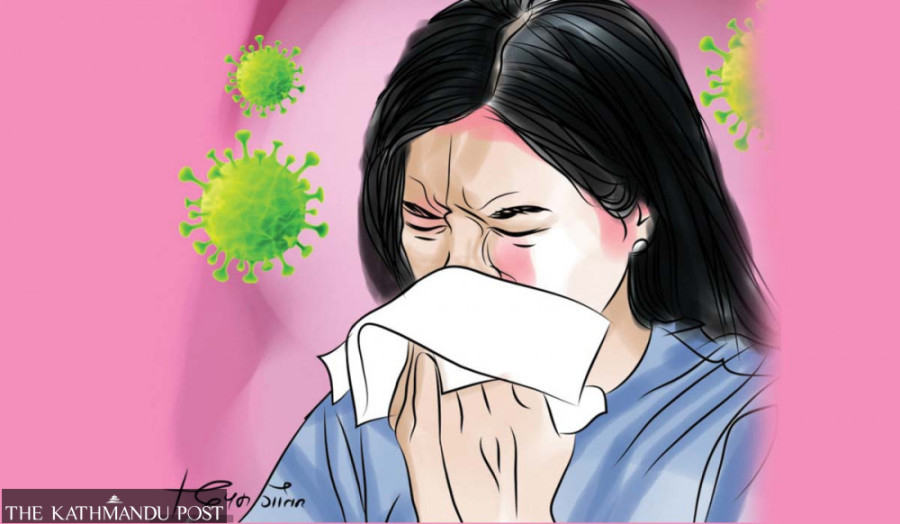Health
Covid risk up with onset of flu season
Experts advise taking precautions including wearing face masks in public, which cuts transmission risks.
Arjun Poudel
Doctors at Bir Hospital in recent weeks admitted at least five young patients—both male and female in the in-patient department, who were infected with viral pneumonia and whose health conditions were serious. Some were also shifted to the intensive care unit later following a deterioration of their health conditions.
“Cases of respiratory problems have sharply risen in the last two weeks in our hospital,” said Dr Ashes Dhungana, dean of the National Academy of Medical Sciences, who is also a pulmonologist and a critical care physician at Bir Hospital. “Along with elderly people and chronic patients of respiratory illness, young people are also visiting hospitals for treatment of viral pneumonia, of late.”
Hospitals throughout the country report an uptick in cases of respiratory illness, amid declining temperatures in recent days. And concern grows over the risk of resurgence of new Covid cases, as neighbouring India has reported a surge in coronavirus infection and outbreaks of JN.1 sub-variant.
“Most beds of the intensive care unit of our hospital have been occupied by patients with respiratory illnesses,” said Dr Sumit Agrawal, spokesman of the Kanti Children’s Hospital, Maharajgunj.
Doctors say the risk of a surge in coronavirus cases during the midst of flu season is concerning, as most of the symptoms of Covid and seasonal influenza overlap with each other. Similar symptoms mean challenges in distinguishing between the two diseases. They have warned that chances of misdiagnosis and negligence could be high during this time, which could lead to delayed treatment and even deaths.
“Both viruses are highly contagious. Covid could cause pneumonia and if left untreated, even death,” said Dr Bikesh Tamrakar, an infectious disease expert at Dhulikhel Hospital. “Also, one could be infected with both viruses at once. Risk of severity and death increases if one gets infected with both viruses at the same time.”
Seasonal influenza and Covid both are respiratory illnesses which affect lungs and spread quickly in communities. Both diseases can cause fever, cough, body aches, sometimes vomiting and diarrhoea, and pneumonia.
Public health experts warn that the country could witness an outbreak of JN.1 sub-variant within two weeks to one month, as all variants of the coronavirus in India have spread to Nepal in a weeks to one month period in the past. India reported an outbreak of the new JN.1 sub-variant of coronavirus.
The JN.1 sub-variant, first detected in September in the United States, is a descendant of BA.2.86, which is a highly mutated variant of the Omicron strain of Covid.
The Union Health Ministry of India reported one death and 628 new Covid cases on Monday, according to media reports.
The World Health Organisation has classified JN.1 as a separate ‘variant of interest’ given its rapid spread around the globe. It, however, said that based on the currently available data, “the additional public health risk posed by JN.1 is currently evaluated as low”.
“This time around, an outbreak could happen even earlier, as mobility of people between two countries is high these days,” said Dr Prabhat Adhikari, an infectious disease expert. “Authorities should step up surveillance measures and this is high time to ask people to wear face masks and avoid crowds.”
The UN health body says that mortality for Covid appears higher than that of influenza, especially seasonal influenza.
“For seasonal influenza, mortality is usually below 0.1 percent,” reads a report of the WHO. “However, mortality is largely determined by access to and quality of health care.”
Doctors suggest those having breathing difficulties, chronic obstructive pulmonary disease (COPD) patients and those suffering from lung diseases to seek medical attention immediately if they have flu-like symptoms.




 9.83°C Kathmandu
9.83°C Kathmandu















